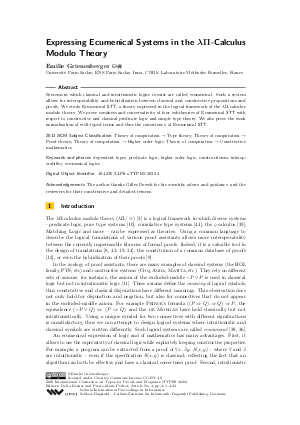@InProceedings{grienenberger:LIPIcs.TYPES.2022.4,
author = {Grienenberger, Emilie},
title = {{Expressing Ecumenical Systems in the \lambda\Pi-Calculus Modulo Theory}},
booktitle = {28th International Conference on Types for Proofs and Programs (TYPES 2022)},
pages = {4:1--4:23},
series = {Leibniz International Proceedings in Informatics (LIPIcs)},
ISBN = {978-3-95977-285-3},
ISSN = {1868-8969},
year = {2023},
volume = {269},
editor = {Kesner, Delia and P\'{e}drot, Pierre-Marie},
publisher = {Schloss Dagstuhl -- Leibniz-Zentrum f{\"u}r Informatik},
address = {Dagstuhl, Germany},
URL = {https://drops.dagstuhl.de/entities/document/10.4230/LIPIcs.TYPES.2022.4},
URN = {urn:nbn:de:0030-drops-184479},
doi = {10.4230/LIPIcs.TYPES.2022.4},
annote = {Keywords: dependent types, predicate logic, higher order logic, constructivism, interoperability, ecumenical logics}
}

 Creative Commons Attribution 4.0 International license
Creative Commons Attribution 4.0 International license












